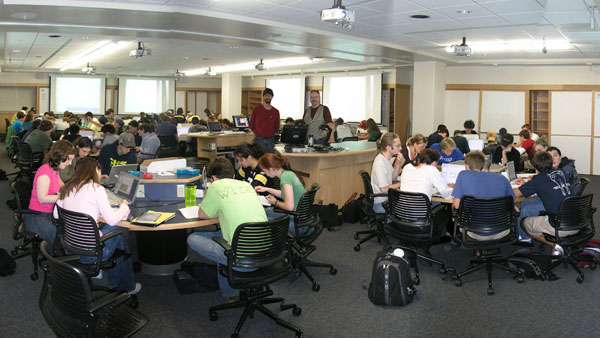The work we have presented in our paper, “Implementing Comprehensive Reform of Introductory Physics at a Primarily Undergraduate Institution: A Longitudinal Case Study,” is a result of a six-year study of the Ithaca College Performance-Based Physics classroom, located in the Center for Natural Sciences, and the changes that we implemented in these nontraditional science classrooms.
In traditional courses, students sit in a lecture hall for 50 minute lectures three days a week. Once per week, there are three-hour lab sessions. Integrated lectures, labs and recitations are more difficult with a large lecture hall. The traditional teaching environment is fractured and, in many cases, out of sequence. Experiments may be based on material different from what the lectures explain. This traditional structure can make it difficult for students.
Our research tried a different approach, and our rooms take advantage of this new method. In 2006, the physics department moved all of our 100-level courses out of lecture halls and into our newly constructed 99-seat Student-Centered Active Learning Environment for Undergraduate Programs–style classroom, or SCALE-UP, in CNS, rooms 206 and 208.
SCALE-UP is a model of teaching developed at North Carolina State University, and in this model of classroom instruction, we integrate experiments, problem solving, lectures, discussions and other work into three two-hour class meetings per week. It takes the labs and integrates them into the lecture time. Students are in three groups of three at round tables. Professors work with groups with the goal of students gaining a solid conceptual understanding of physics.
We measured the learning gains of our students using a nationally recognized physics concept survey in the class. Prior research in teaching and learning suggested much deeper student understanding of problem solving and conceptual understanding in a SCALE-UP–style classroom compared to the traditional large lecture hall with separate labs.
Our initial results were disappointing. We learned that a complete overhaul of our instructional methods was necessary. For the next seven years, we adjusted instruction, eventually settling on a process that mixes think-pair-share conceptual questions, or “clicker questions,” with problem-solving techniques that revolve around daily use of the Lecture Tutorials in Introductory Physics. Our students’ learning gains are now consistently and considerably at or above the national average, suggesting a correlation between learning gains and our classroom structure.
Education research provides a variety of instructional options that professors can adapt to the classroom to help students better understand conceptual material. These methods often appear easier to implement than they are in practice. New instructional methods are often squeezed in with an existing instructional plan, which can actually lead to decreases in student understanding of the material.
This work will help professors and administrators who are considering similar changes. However, the results may not initially be evident, so patience is necessary in assessing different learning methods.














